Being the only black girl in your classroom can really shape your perception of reality. Growing up in California, I was in for a real culture shock when I stepped foot into any classroom. My main shock was that Black History Month wasn’t celebrated in any of my schools from elementary to high school. Learning about advancements that black people created was something I never engaged in. Noticing creations and inventions made by black people was something I was blind to for fourteen years. Was I considered what you would call “whitewashed?” No. I was well aware of who I was and never cared to fit in with the caucasians I spent most of my life surrounded by. Was I a little ignorant to certain cultures? Yes. Growing up I would hear the emphasis on President’s day, Columbus Day, even St. Patrick’s Day but shockingly, never about Black History Month. In my history classes, the topic of slavery was spoken about for five seconds then switched back to a spotlight of caucasian heros. I have spent fourteen years in blind ignorance about the struggles of prejudice that my race endured. I was unaware of how society holds biases against us because I never grew up around it. In my community race didn’t separate you from your personality. I didn’t even possess knowledge about how to manage my natural hair or what my natural curls even looked like before flat ironing. Now as a twenty-one year old attending a Historically Black University, my natural curls are loose. They symbolise the cultural roots I wasn’t aware of for years because of how I was camouflaged by an all white community but have now found. I feel more knowledgeable about Black history, Black women, and the current state of the Black community at large. Some of the things I have learned are that Black women are the most educated group in the United States, many successful inventions were created by the hands of Black people, and that there are countless Black businesses to support. As I have continued along this journey, I have also made it a habit to increase my knowledge by finding, researching, and supporting more black businesses.
This article is written by a student writer from the Her Campus at Hampton U chapter.



